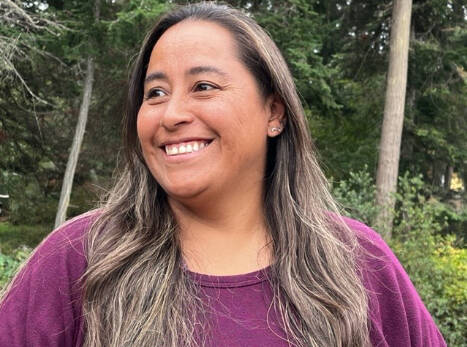Members of the Orcas Women’s Coalition are so happy to present the second installment of the “Love Letter Series.” It highlights the extraordinary women who live on Orcas. This interview was conducted by Maria Poblet.
This is a love letter to a woman making a difference in the Orcas Island community. Her name is Carla Shanks, and she teaches social-emotional learning at our public school. Her passion for education is contagious.
She says, “I wasn’t satisfied with schools. Their approach was too closed-minded and traditional for what I want my kids to be exposed to. That’s why I studied to be a teacher. To be more helpful. Not to create a perfect school, but at least a good environment where kids can feel safe and heard and loved. Once you acknowledge a kid as a person, it’s much easier to go through learning with them instead of imposing.”
In 2020, Carla and her family were living in Bolivia where she grew up, but faced with pandemic restrictions and political unrest and instability, they decided to come back to the US and be closer to her husband’s family. She and her husband nurture their two biracial kids’ connection to their Bolivian roots by visiting every year.
Her experience as an immigrant and her position at the school make her an ally to any kid who is having a hard time. And she hears more than her fair share of the problems our kids are facing.
“It was heartbreaking the first year to hear kids talking about their experiences,” she says. “Kids who have a hard time completing assignments because their parents are dealing with the challenges that come with being undocumented. Kids who take care of siblings and while their parents are working. Kids who have huge responsibilities on their plate.”
She sees what other people often do not see, barriers to education that can often be invisible, and she builds solutions. She worked to ensure school documents were translated for parents, providing a crucial connection between our school and its Spanish-speaking parents. She is also a point of connection for many Latin American parents. They rely on her not just for translations but also call her for advice and consultations, a role beyond her job in the school that is about her role in the community. She builds bridges between parents and teachers and tries to instill a sense among these parents who face many barriers to engagement that their perspective is valued and important and that our school belongs to them and their kids as much as it does to anyone else.
She says, “I love to be part of a school that is respectful, that respects students’ identities and experiences. Where parents have equal opportunities to participate and be involved.”
The kind of work she does often happens on a text thread, in the hallway at school, in the pickup line. It’s the kind of work that women do that is too often taken for granted — tending to relationships, transforming interpersonal conflict, tending to community.
As a parent, I feel deep gratitude that Carla’s passion and insight are part of what shapes my child’s education and learning environment. In a time where we are too often pitted against each other, I’m grateful there are people like Ms. Carla who help us figure out how we can be stronger together.
When I asked her who the next love letter should go to, Carl said: “The woman who I admire the most right now is Estefany Rodriguez because she has a special kid that is wonderful and so loving and caring. Even though the language barriers are hard she never gives up to be on top of any situation related to school or her kid.”



